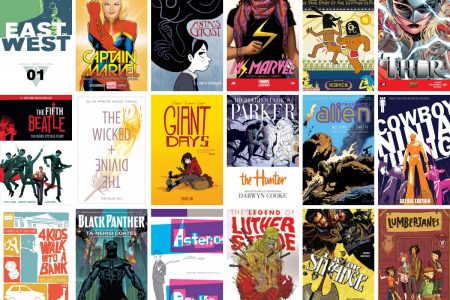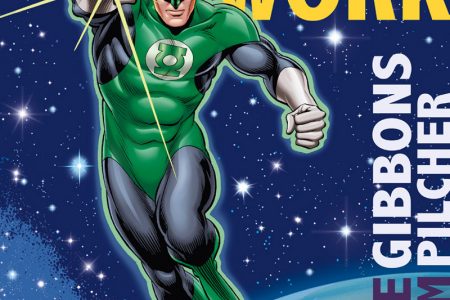The main part of N.I.C.E. finished at 5pm so that they could change the hall from the artists’ alley to a room to hold the waiting audience for Alan Moore’s appearance. Unfortunately, everything else in Wicksteed Park closed at the same time, meaning that there was little to do while waiting to be let back in (note to organisers of N.I.C.E. for next year: sort that out), so soon people were joining the queue to get back in. The doors opened and everyone rushed in to get a good seat in front of the stage where Alan would be talking.
He was introduced by a local librarian, who was grateful for our donations of trade paperbacks to see Alan, something which he reiterated. The talk was titled ‘How To Write Comics’ but Alan said it was going to be about reading, which is important for writing. He then proceeded to talk for an hour with no script and no pauses and, except for one moment when he had to be reminded of where he was after a digression, it flowed smoothly and casually from a master storyteller.
Alan talked about growing up in a rough part of Northampton, where literacy levels were low, so his parents (who could read) made sure that he could read as well. When he started school, he was told he could join the library, which he thought was great because they only had four books at home. Alan praised reading and libraries, talking about studies showing that if you can read, your education is assured because you can learn for yourself. As he said, the internet should do this, but it was mostly porn.
He talked about reading lots of books from the library, mostly to do with legend and magic and myths (Arthur and Robin Hood), which seemed more interesting. His first introduction to the American comics used as ballast in boats was via a local shop called Sid’s, mostly the DC books, which he devoured before eventually tiring of the genteel rich people. His introduction to Marvel was an accident: while in hospital, his mum offered to buy him some comics to read; he told his mum to get the book with the people in blue on the front, and she got him Fantastic Four #3.
He read Marvel because the characters were more real and because DC had fired the likes of Gardner Fox and John Broome for the audacity to come to DC with the idea of a union (for health insurance and pension, so that they could keep working on comics and make money for the company); instead, DC got rid of the people who had changed their fortunes and replaced them with the fans who were writing fanzines – US fandom was already nostalgic for the old heroes of the 1940s by the late 1950s – because they would work cheaper and wouldn’t jeopardise their dream of writing their comic book idols. Alan compared fans writing the books to inbreeding: if you don’t get new blood, then you get weird-looking kids. For example, Gardner Fox had written lots of pulp novels of different genres; Alan said it was important to read other things and not just comics.
He talked about losing interesting in comics in 1967, when he was 14, because Kirby and Ditko had left Marvel and had been replaced by people not as good; he also mentioned that Jaunty Jack was not jaunty, Sturdy Steve was not sturdy, but Smiling Stan was always smiling, something he would return to later in the evening. However, the company publishing Casper the Friendly Ghost did some reprints of old Will Eisner Spirit comics, which saw for the first time and was blown away: ‘This is what I like about comics – the way you can tell a story.’
Alan also said that superheroes were fine when you’re young because they are designed for youth and not for later years – Batman is not suited to the burden of all the serious weight that has been attached to him, and he knows the irony of this from the author of The Killing Joke (he thinks that it’s one of the worst things he’s ever written). He still had a love of comics, such as the British stuff from Leo Baxendale, even if he thought that Baxendale had an obsession with working-class kids getting slippered by parents at the end of every strip, and Frank Bellamy on Garth and Dan Dare (he thinks that Bellamy is one of the finest artists this country has ever produced).
Alan then talked about how he got into fandom: there was a UK rip-off of Marvel comics called Power Comics, where a sub-editor called Steve Moore (no relation – Alan says that Steve will have that on his tombstone) accidentally put his address in a publication, so Alan basically stalked him. The first UK comic book convention was in 1968, but Alan couldn’t go ‘because mum wouldn’t let me; so unfair’ (said in a great Kevin The Teenager delivery), but he could go to the next one in 1969, held in the Waverley Hotel in London. According to Alan, it was about 50 people, most no older than their mid-twenties, all there to share their enthusiasm for comics. Frank Bellamy was a guest and was completely astonished that so many people liked his work. Bellamy said that he had some artwork, if they wanted to look, so they were all reverentially passing around original Garth pages. As Alan said, he misses those early cons, devoid of egos (himself included).
Alan talked about how he left school and worked for the gas board invoice department, but he was bored – he wanted to support himself with his art, so he quite, only for his wife to tell him she was pregnant. He could have gone back to the job but he knew he would have found it hard to stop if he looked into the baby’s eyes, so he stuck to his guns and tried to create while on the dole. After four months, he had one page inked but not lettered, half a page drawn but not inked – he realised that this wasn’t going to work.
So that’s when he tried other things – he got strips in Sounds magazine and the local paper. Then, in 1977, 2000 AD came out – John Wagner and Pat Mills created the weekly comic book because they were bored of writing girls’ comics, so they thought they’d try writing for themselves. Alan had been writing five-panel strips, learning about telling a story and how to meet deadlines, so he started doing shorts in 2000 AD (and back-ups in Doctor Who), after getting advice from Steve Moore: Alan showed him a script, and Steve took it to pieces and quite rightly – too much dialogue in that panel, that panel is unnecessary because it doesn’t move the story on, too much detail in that panel (anyone else said this to Alan since), and Alan was grateful.
Alan then took to the questions and answers because someone told him it was after 7pm – we could have kept on listening him talk about himself for much longer, even after he apologised for not talking about writing and being allowed to indulge in doe-eyed nostalgia. The first question was about the John Dee opera, which led him to talk about Dee and his life and how he helped to design Manchester when Queen Elizabeth sent him there when she got bored of him, where all his family except for his daughter died of the plague – Dee and his daughter were the inspiration for Prospero in The Tempest – but he said that it didn’t work out with the Gorillaz because they said they would do something for Dodgem Logic, during which he wrote a third of the opera before the Gorillaz didn’t bother to do their thing, so he finished the opera and gave it to a friend to work on.
A young kid in the front row asked him why he makes his comics complicated. Yes, Alan said, his comics are complicated because he thinks reading should be a challenge to make you think more, in a good way. The next question was which came first: narrative or character – the explanation was that both derive from each other, which involved talking about the comic book he is working on at the moment, called Providence, which is 10 issues for Avatar Press, following on from Neonomicon and set in Lovecraft’s USA in 1919. It’s about a journalist who is secretly Jewish and gay, which is in contrast to Lovecraft, who was a complete bigot and hated everyone (immigrants, Jews, gays). The funniest part was that Alan was writing Providence to pay his taxes – he has a deal with Avatar of an advance if he needs it and he can write anything he wants.
Somebody asked a very stupid question about the rumour that ‘his mate heard’ that Tom Strong was written as a bet that he could write something without adult themes. Obviously he didn’t, but it led to the inception of ABC – Awesome Comics had folded (because Liefeld is an idiot) and he felt bad for the artists he had been working with, so he decided to something more with them. One night, he was writing a list of names, which became the ABC characters – Tom Strong and Promethea were what if there were no superheroes and comics had started from the pulps (a bit like Warren Ellis’s Apparat comics). The strangest aspect was when he was told the Tom Strong was brave – “Brave? A Doc Savage knock-off? – but it was because of the mixed marriage with a mixed-race child, possibly the first in mainstream US comics, something he hadn’t even thought about and he was shocked that this was a thing in the year 2000.
The final question was about Stan Lee: Lee had said in an interview that the artist he’d most like to work with was Alan Moore, to which Alan said ‘Yeaahhh’ in reply, which was priceless. Alan does not like Stan Lee. At all. To Alan, Jack Kirby wrote and drew the Marvel books, with dialogue suggestions in the margins, and Stan just ‘fancied up’ Kirby’s slightly shonky dialogue. In Alan’s opinion, Lee is not a talented writer and he helped steal creations from the talented artists, while he keeps on smiling. His favourite memory of Lee is seeing him squirm on the Jonathan Ross-fronted documentary about Steve Ditko, where Ross ‘Paxmaned’ him about Ditko being the creator of Dr Strange. He was told by an agent (or someone) that they had given Alan’s phone number to Stan. I don’t think Stan ever called …
It was a delight to listen to Alan in person, and this was a collection of my memories of the event – you can watch or listen for yourself at these various links. I haven’t watched or listened because I don’t want to see if my memories are any different. You can choose for yourself.




